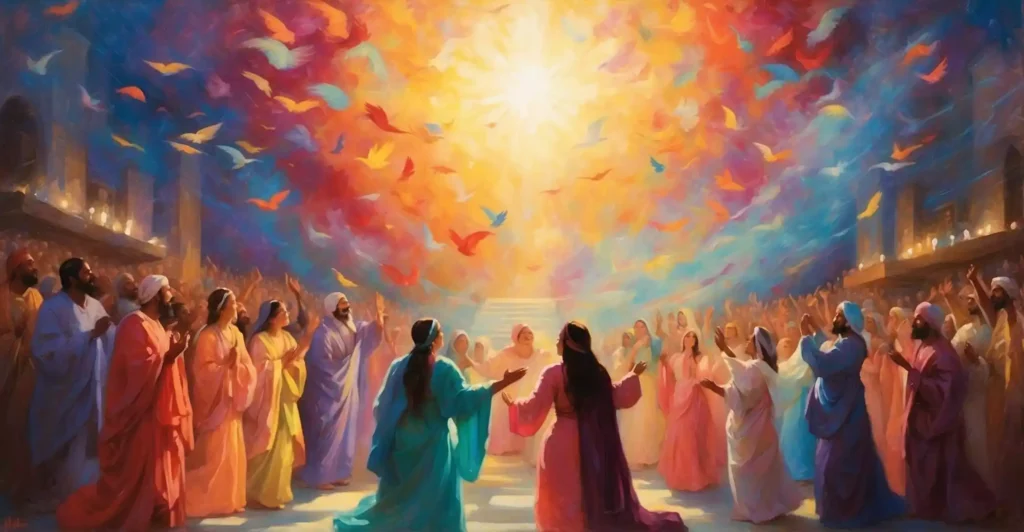Summary
- 1 The most beautiful psalms: summary table
- 2 Psalm 23: "The Lord is my shepherd."
- 3 Psalm 91: Shelter and Protection
- 4 Psalm 19: The Glory of God in Creation
- 5 Psalm 139: The Knowledge and Presence of God
- 6 Psalm 121: Encouragement and Hope
- 7 Psalm 51: Repentance and Forgiveness
- 8 Psalm 150: The Invitation to Praise
- 9 Conclusion
- 10 FAQ - Frequently Asked Questions
- 10.1 How can Psalm 23 help to find peace in daily life?
- 10.2 How does Psalm 91 offer comfort in situations of fear and anxiety?
- 10.3 How can Psalm 150 inspire a more joyful and grateful daily life?
- 10.4 How can I use Psalm 91 as a source of strength in difficult times?
- 10.5 What lessons can we learn from Psalm 19 about the beauty of nature and the wisdom of God?
Get ready to explore the most beautiful psalms of the book of Psalms, works of art that have touched human hearts for centuries. These psalms offer messages of trust, protection, creation, divine presence, encouragement, repentance, e praise. Let us discover them together, understanding their depth and beauty.

The most beautiful psalms: summary table
| Psalm | Description |
|---|---|
| Psalm 23 | Known as "The Lord is my shepherd," it offers a message of trust In God. |
| Psalm 91 | A psalm of protection and trust in God as a refuge in difficulties. |
| Psalm 19 | It celebrates God's glory in creation and the perfection of His law. |
| Psalm 139 | Expresses awe at God's omniscient knowledge and ubiquitous presence. |
| Psalm 121 | With the famous verse "I lift up my eyes to the mountains: where will help come from?" |
| Psalm 51 | A powerful psalm of repentance and supplication for forgiveness. |
| Psalm 150 | The last psalm in the book of Psalms, an invitation to praise God with every instrument and our whole being. |
Psalm 23: "The Lord is my shepherd."
The Lord is my shepherd:
I don't miss anything;
2 On grassy pastures makes me rest
To still waters he leads me.
3 It refreshes me, guides me to the right path,
For the sake of his name.4 If I were to walk through a dark valley,
I would fear no evil, for you are with me.
Thy rod and thy staff
They give me confidence.5 Before me you prepare a table
Under the eyes of my enemies;
Sprinkle oil on my head.
My cup overflows.
6 Happiness and grace will be my companions
Every day of my life,
And I will dwell in the house of the Lord
For very long years.
Origins and Historical Context
The Psalm 23, is among the most beloved (and well-known) texts in the Bible, and is normally attributed to King David.
In the time when David lived, raising sheep was not only a widespread trade but also a powerful symbol of leadership and care. This psalm, therefore, is not only a prayer, but also an example of extraordinary poetry that draws inspiration from daily life at the time to communicate deep spiritual concepts. The image of the shepherd is used to represent the bond between God and his people, where God is seen as a constant guardian, protector, and guide. Considering the historical context, the psalm expressed the Jewish people's trust and dependence on God, especially during times of exile and hardship.
Interpretation and Meaning
"The Lord is my shepherd; I shall not want for anything." - Psalm 23 begins with a phrase that immediately conveys trust and confidence. Speaking of the shepherd, it makes us think of his guidance, nourishment and protection. This Psalm gives us comfort and hope, assuring us that, with God to guide us, we will lack nothing essential. Seeing God as a shepherd implies a personal and intimate relationship; he is not a distant God, but one who walks beside us, who knows us personally and cares for us. This is especially significant in difficult times, when the figure of the shepherd reminds us that we are not alone or without guidance.
Psalm 23 is always an inspiration and consolation to so many. Its promise to be guided and protected is important, especially in a world full of uncertainties and challenges. This Psalm invites us to reflect on our relationship with the divine and about the trust we can have in a force greater than ourselves. It also reminds us to seek moments of peace and reflection, just as the shepherd leads his sheep to quiet places. For many, Psalm 23 is a reminder that despite life's difficulties, there is always a constant presence that offers us comfort, hope and guidance.
Psalm 91: Shelter and Protection
You who dwell in the shelter of the Most High
And dwell in the shadow of the Almighty,
2 Say to the Lord, "My refuge and my fortress,
My God, in whom I trust."3 He will free you from the hunter's snare,
From the plague that destroys.
4 He will cover you with his feathers
Under its wings you will find refuge.
5 His faithfulness will be your shield and armor;
Thou shalt not fear the terrors of the night
Nor the arrow that flies by day,
6 The plague that wanders in darkness,
The extermination that devastates at noon.7 A thousand will fall at your side
And ten thousand to your right;
But nothing will be able to affect you.
8 Only you look, with your eyes
You will see the chastisement of the wicked.
9 For your refuge is the Lord
And you have made the Most High your dwelling place,
10 misfortune will not be able to strike you,
No blow will fall on your tent.
11 He will give orders to his angels
To guard you in all your steps.
12 On their hands they will carry you
So that you do not trip over the stone your foot.
13 You will walk on asps and vipers,
You will crush lions and dragons.14 I will save him, because he has entrusted himself to me;
I will exalt him, for he has known my name.
15 He will call upon me and I will give him an answer;
By him I shall be in misfortune,
I will save him and make him glorious.
16 I will satiate him with long days
And I will show him my salvation.
Origin and Historical Context
The Psalm 91 stands out as one of the most powerful and reassuring texts in the Bible. Written at a time of great turmoil and uncertainty, this psalm offered its original audience a sense of security and comfort in God's promises of protection and care. The historical context of this psalm is marked by conflicts, exoduses and challenges that the people of Israel constantly faced. In the midst of these turbulences, the psalm emerges as a beacon of hope, promising that God will be a refuge and fortress for those who put their trust in Him. This promise of divine protection was of great comfort to a people often in search of security and stability.

Analysis and Interpretation
The Psalm 91 begins with words:
You who dwell in the shelter of the Most High
And dwell in the shadow of the Almighty,
Say to the Lord, "My refuge and my fortress,
My God, in whom I trust."
These words immediately create an image of safety and security. The entire psalm is an expression of unconditional trust in God, who is seen as a refuge and a bulwark against all adversities. In particular, the psalm speaks of being delivered from tangible dangers such as "the snare of the hunter" and "the plague that destroys," metaphors that can be interpreted as the various challenges and dangers of life. What makes this psalm particularly powerful is its emphasis on God's presence and protection, not just as an abstract concept, but as a tangible and personal reality.
Psalm 91 maintains its relevance, serving as a source of hope and strength in times of crisis and uncertainty. In a world that often seems overwhelming and unpredictable, the words of this psalm offer a deep sense of peace interior and safety. It reminds believers of all ages that regardless of challenges and fears, there is a source of divine protection that we can call upon. This psalm is especially meaningful in times of anxiety or fear, serving as a reminder that we are not alone in our struggles and that we can find refuge and comfort in a presence greater than ourselves.
Psalm 19: The Glory of God in Creation
The heavens narrate the glory of God,
And the work of his hands heralds the firmament.
3 Day to day entrusts its message
And night to night conveys news of it.4 It is not language and it is not words,
Of which no sound is heard.
5 Throughout the earth their voice spreads
And to the ends of the earth their word.6 There he pitched a tent for the sun
Coming out as a bridegroom from the bridal chamber,
He exults as a valiant man walking the path.
7 He rises from one end of the sky
And its race reaches the other extreme:
Nothing escapes its warmth.8 The law of the Lord is perfect,
refreshes the soul;
The testimony of the Lord is true,
Makes the simple wise.
9 The Lord's orders are just,
Make the heart rejoice;
The Lord's commands are clear,
They give light to the eyes.
10 The fear of the Lord is pure; it always lasts;
The judgments of the Lord are all faithful and righteous,
11 More valuable than gold, by much fine gold,
Sweeter than honey and a dripping honeycomb.12 Your servant in them is also instructed,
For those who observe them, the profit is great.
13 The inadvertences who discerns them?
Absolve me from the faults I do not see.
14 Even from pride save your servant
So that on me he has no power;
Then I will be blameless,
I will be pure from great sin.15 May the words of my mouth be pleasing to you,
Before you the thoughts of my heart.
Lord, my rock and my redeemer.
Origins and Historical Context
The Psalm 19 is a celebration of God's glory manifested in two main ways: through nature and through divine law. Written by King David, one of the Bible's greatest poets and musicians, this psalm combines wonder at the natural world with deep reverence for the wisdom of God's laws. In ancient times, when understanding of the universe was much more limited, the majesty of the starry sky and the regularity of natural cycles were directly attributed to divine intervention. Psalm 19 reflects this worldview, where every element of creation is seen as a reflection of God's glory.
Interpretation and Key Messages
The psalm opens with the words: "The heavens tell of the glory of God, and the work of his hands heralds the firmament.". These phrases express a sense of wonder and awe at the vastness and beauty of creation. The psalm then goes on to praise the perfection of the Lord's law, which is considered more precious than gold and sweeter than honey. This second part of the Psalm emphasizes how God's law is a guide reliable for life, offering wisdom, joy and enlightenment. In it, natural creation and divine law are presented as two sides of the same coin, both revealing God's glory and wisdom.
I Psalm 19 can serve as a powerful reminder of the beauty and complexity of the universe around us. It invites us to look beyond the hustle and bustle of daily life and contemplate the grandeur of creation, seeing in it the hand of the creator. At the same time, the psalm reminds us of the value of wisdom and moral guidance, which can be found in God's word. In an age of confusion and moral relativism, Psalm 19 offers us a compass for navigating the often tumultuous waters of modern life, emphasizing the importance of rooting our lives in eternal values and principles.
Psalm 139: The Knowledge and Presence of God
Lord, you scrutinize me and know me,
2 you know when I sit and when I stand.
You penetrate my thoughts from afar,
3 Scrutinize me when I walk and when I rest.
All my ways are known to you;
4 my word is not yet on the tongue
And you, Lord, already know it all.
5 Behind and in front you surround me
And lay your hand on me.
6 Wonderful to me your wisdom,
too high, and I don't understand it.7 Where to go away from your spirit,
Where to escape from your presence?
8 If I go up to heaven, there you are,
If I go down to the underworld, there you are.
9 If I take the wings of the dawn
To dwell at the edge of the sea,
10 Even there your hand guides me
And grasp me with your right hand.
11 If I say, "At least let the darkness cover me.
And around me be the night."
12 Not even darkness to you is dark,
And the night is as clear as day;
To you darkness is like light.13 You are the one who created my bowels
And you wove me into my mother's bosom.
14 I praise you, for you have made me as a prodigy;
Are wonderful your works,
you know me to the core.15 My bones were not hidden from you
When I was being trained in secrecy,
Woven into the depths of the earth.
16 Still formless saw me your eyes
And everything was written in your book;
My days were set,
When one did not yet exist.
17 How deep for me your thoughts,
How great their number, O God;
18 If I count them they are more than sand,
If I think they are finished, with you they are still.19 If God would suppress sinners!
Get away from me, you bloodthirsty men.
20 They speak against you with deception:
Against you they rise with fraud.
21 I do not hate, perhaps, Lord, those who hate you
And do I not detest your enemies?
22 I detest them with implacable hatred
As if they were my enemies.
23 Scrutinize me, God, and know my heart,
Try me and know my thoughts:
24 see if I walk a path of lies
And guide me on the path of life.
Origin and Historical Context
The Psalm 139 is a masterpiece of spiritual introspection and reflection. Traditionally attributed to King David, this psalm explores the themes of God's omniscience and omnipresence in a deep and personal way. At a time when understanding of the universe was still primitive, the idea of a God who knows every aspect of human life was revolutionary and comforting. This psalm presents God not only as a distant creator, but as a being who knows each person intimately, their thoughts, their actions, and even their most secret feelings. It is a text about a very personal and direct relationship with the divine.
Text Analysis and Themes
The psalm begins with the words: "You scrutinize me and know me.", which immediately establish a tone of intimacy and deep personal knowledge. This psalm explores the idea that God is not only aware of our every move, but understands us better than we do ourselves. There is a sense of wonder and even reverential awe in being completely known and seen by God. This awareness leads the author of the psalm to reflect on his own life, choices and spiritual journey, recognizing that nothing can be hidden from God.
Psalm 139 offers a unique perspective on our relationship with God. It reminds us that despite our tendency to hide parts of ourselves or feel misunderstood, there is a presence that knows us deeply. This awareness can be a source of great comfort, but also a challenge, as it invites us to live with integrity and honesty, knowing that we are always under God's watchful gaze. The psalm also encourages us to explore our relationship with ourselves and the divine, suggesting that self-understanding and self-acceptance are a fundamental part of our spiritual journey.
Psalm 121: Encouragement and Hope
I look up at the mountains:
Where will the help come from?
2 My help comes from the Lord,
Who made heaven and earth.3 It will not let your foot falter,
Your janitor will not fall asleep.
4 He will not fall asleep, he will not get sleepy,
Israel's keeper.5 The Lord is your keeper,
The Lord is like a shadow that covers you,
And he stands at your right hand.
6 In the daytime the sun will not hit you,
Nor the moon at night.
7 The Lord will protect you from all evil,
He will protect your life.
8 The Lord will watch over you when you go out and when you come in,
From now and forever.
Background and Origins
The Psalm 121, a hymn of hope and encouragement, has deep roots in Jewish tradition. Composed as an "Ascension Song," it was originally recited by pilgrims on their way to Jerusalem. This psalm, then, was an accompaniment for journeys, both literal and spiritual, offering support and comfort to those on the way. The context of this psalm is thus one of movement, seeking and hope, representing a journey not only physical but also inner, toward greater understanding and closeness to God.

Meaning and Interpretation of Psalm 121
Psalm 121 begins with a powerful question: "I look up to the mountains: where will help come from?" This openness reflects a sense of search and need, a question that resonates through the ages. The answer comes soon after, assuring that help comes from the Lord, the creator of heaven and earth. This statement of trust is a promise of continued protection and care, not only in physical terms but also in spiritual terms. The psalm emphasizes that God does not sleep or rest, but is ever vigilant, an ever-present janitor in the believer's life.
Psalm 121 can be a powerful reminder of the support and protection available to us. In a world that can seem chaotic and uncertain, the psalm offers us a vision of stability and security. It reminds us that no matter how lost or uncertain we may feel, there is a source of help and support that never abandons us. Psalm 121 is an invitation to lift our gaze beyond our immediate circumstances, to seek a broader perspective and to place our trust in a higher power that guides and protects us.
🎯 Key Points
- A psalm of travel and protection, offering support in times of need.
- Expression of trust and hope in God as the ever-present guardian.
- Applicable to various daily challenges, remembering that we are never alone.
Psalm 51: Repentance and Forgiveness
Have mercy on me, O God, according to your mercy;
In your great goodness blot out my sin.
4 Wash me from all my faults,
Cleanse me from my sin.5 I acknowledge my guilt,
My sin is always before me.
6 Against you, against you alone have I sinned,
What is bad in your eyes, I have done;
So you are right when you speak,
Righteous in your judgment.7 Here, in guilt I was begotten,
In sin my mother conceived me.
8 But you want sincerity of heart
And in my depths teach me wisdom.9 Purify me with hyssop and I will be world;
Wash me and I will be whiter than snow.
10 Let me feel joy and gladness,
Will exult the bones you have broken.11 Look away from my sins,
Erases all my faults.12 Create in me, O God, a pure heart,
Renews in me a steadfast spirit.
13 Do not repel me from your presence
And do not deprive me of your holy spirit.
14 Make me the joy of being saved,
Support in me a generous soul.15 I will teach the wanderers your ways
And sinners will return to you.
16 Deliver me from blood, God, God my salvation,
My tongue will exalt your justice.
17 Lord, open my lips
And my mouth proclaims your praise;
18 Since you do not like the sacrifice
And, if I offer burnt offerings, do not accept them.
19 A contrite spirit is sacrifice to God,
An afflicted and humiliated heart, God, you do not despise.20 In your love give grace to Zion,
He raises the walls of Jerusalem.
21 Then you will welcome the prescribed sacrifices,
holocaust and the entire oblation,
Then they will immolate victims above your altar.
Historical Background and Context
The Psalm 51 is one of the most intense and moving psalms regarding repentance and forgiveness. Traditionally attributed to King David following his sin with Bathsheba, this psalm reflects a deep awareness of sin and a sincere desire for reconciliation and purification. In ancient times, sin was often seen as a stain that needed to be cleansed, and this psalm vividly expresses that concept, emphasizing God's mercy and grace as the means for redemption and renewal.
Analysis and Interpretation of the Psalm
The psalm opens with an impassioned appeal to God's mercy: "Have mercy on me, O God, according to your mercy; according to your great goodness blot out my guilt.". These words express a sense of despair but also of hope. The psalmist does not make excuses for his behavior, but fully admits his sin and asks God to be cleansed and renewed. The request to be "cleansed with hyssop" conjures up images of a purification ritual, emphasizing the desire for inner as well as outer change.
Psalm 51 remains a source of inspiration for anyone who finds themselves to face one's faults and seeks the path to forgiveness and renewal. This psalm teaches us that true repentance requires honesty and vulnerability, and that God's mercy is always available, even in times of greatest despair. Psalm 51 is a reminder that despite our mistakes and failures, there is always room for redemption and a new beginning.
🎯 Key Points
- A psalm of deep repentance, expressing the need for inner purification.
- An expression of hope in God's mercy and forgiveness.
- Applicable in the spiritual life of anyone seeking renewal and redemption.
Psalm 150: The Invitation to Praise
Hallelujah.
Praise the Lord in his sanctuary,
Praise him in the firmament of his power.
2 Praise him for his wonders,
Praise him for his immense greatness.3 Praise him with trumpet blasts,
Praise him with harp and zither;
4 Praise him with timpani and dance,
Praise him on the strings and flutes.5 Praise him with sound cymbals,
Praise him with ringing cymbals;
Every living person give praise to the Lord.
Origins and Historical Context
The Psalm 150 represents the exuberant conclusion to the book of Psalms. This psalm is a universal invitation to praise, transcending the boundaries of time and place, encouraging everyone everywhere to praise God by any means possible. Written in a historical context when music and dance played a central role in religious and social life, Psalm 150 encourages the use of various musical instruments and even one's own body to express joy and gratitude to the creator. It is a hymn of pure and unconditional joy, celebrating God's greatness in all its manifestations.

Analysis and Interpretation of the Psalm
Psalm 150 begins and ends with the exhortation "Praise God!" This refrain acts as a frame enclosing various expressions of praise. "Praise God with the sound of the trumpet, praise Him with the harp and zither." - these lines illustrate the idea that every instrument, every voice, every breath can be used to express praise. It is not just an invitation to praise God in churches or temples, but wherever one is. The psalm embraces the entire spectrum of human expression, from art to music to movement, as valid means of connecting with the divine.
Psalm 150 can serve as a powerful reminder of the importance of gratitude and joy in our daily lives. In a society often consumed by negativity and cynicism, this psalm invites us to find moments to celebrate and praise, recognizing the beauty and goodness in our midst. Whether it is listening to music, attending a church service, or simply admiring a sunset, Psalm 150 encourages us to use these experiences as opportunities to connect with something greater than ourselves and to recognize God's presence in our lives.
🎯 Key Points
- An invitation to celebrate and praise God in every aspect of life.
- The importance of expressing gratitude and joy through various means.
- Applicable at all times and situations, encouraging a positive outlook on life.
Conclusion
The Psalms we have explored offer an extraordinarily wide range of emotional and spiritual expressions that resonate deeply even today. From the encouragement and hope of Psalm 121, to the heartfelt repentance of Psalm 51, to the unconditional joy of Psalm 150, these ancient texts continue to speak to our hearts, offering comfort, guidance and inspiration. In an ever-changing world, the Psalms remain an inexhaustible source of wisdom and strength, inviting us to reflect, grow and seek a deeper connection with the divine.
FAQ - Frequently Asked Questions
How can Psalm 23 help to find peace in daily life?
Psalm 23 is a source of comfort and hope, promising divine guidance and protection. In daily life, it can be a reminder that despite challenges and worries, there is a reassuring presence to guide us. The metaphor of the shepherd caring for his sheep can help us feel protected and supported, especially in times of stress or uncertainty.
How does Psalm 91 offer comfort in situations of fear and anxiety?
Psalm 91 speaks of God as a refuge and fortress, offering a sense of safety and security against the fears and anxieties of life. It is a reminder that, even in the most difficult situations, we can find safety and peace by placing our trust in a higher power. His words can be a balm for the soul, especially when we feel vulnerable or powerless.
How can Psalm 150 inspire a more joyful and grateful daily life?
Psalm 150 is an exuberant invitation to praise and joy. This psalm can inspire us to find daily moments of gratitude and happiness, encouraging the expression of joy through music, dance or any form of art. Remember that every aspect of life can be an opportunity to celebrate and appreciate the blessings, large and small, that surround us.
How can I use Psalm 91 as a source of strength in difficult times?
During difficult times, Psalm 91 can be a powerful source of strength and encouragement. Its words can be used as a mantra or prayer to remind us that we are not alone in our struggles. Meditating on its promises of protection and refuge can provide comfort and reassurance, reminding us that there is always a benevolent presence ready to offer us support and shelter.
What lessons can we learn from Psalm 19 about the beauty of nature and the wisdom of God?
Psalm 19 teaches that nature is a manifestation of God's glory, inviting us to reflect on the beauty and complexity of the universe. This psalm encourages us to look at the world around us with eyes of wonder and gratitude, seeing in every aspect of creation, from the vastness of the sky to the minuteness of a flower, a reflection of God's wisdom and creativity. It is a reminder that nature is not only to be admired but also respected and protected as a divine expression.
